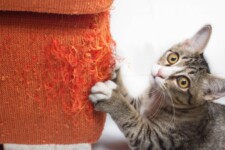Siamese Cat Yowling (Why it Happens & How You Can Stop It)
Are you spending time trying to get your Siamese to be quiet so that you or other family members can get some rest, or concentrate on work?
Your Siamese cat can be yowling for several reasons, and you may be trying to work out why they yowl so much, and what this means.
Siamese cats often yowl to let you know that they want something. This could be food, attention, play, or because something is wrong. Siamese are naturally vocal cats, but you can encourage your cat not to meow as often through careful training and good habits.
Let’s look at some common reasons Siamese cats yowl, and some tips and tricks to help reduce their yowling.

Yowling For Food and How to Stop It
Your Siamese may yowl because they are hungry. If you do not feed your cat enough or there are long gaps between its meals, they may yowl at you to let you know that they want something to eat.
This can be problematic, because if you respond to their yowls for food by feeding them, they will learn that this is the best way to get something to eat. On the other hand, your cat is hungry, and you need to give them food.
It is therefore important to stop this behavior before it starts by making sure that you give your cat regular meals at the correct intervals.
Most adult cats can be fed a couple of times a day, but you may want to give your cat smaller, more regular meals. This could help it to feel happier and may therefore prevent food yowling.
It is important not to respond to begging for food. Wait until your Siamese stops meowing before you feed it if it has got into the habit of begging.
This may be difficult to begin with, but it is an important aspect of preventing yowling.
Yowling For Attention and How to Stop It
Sometimes, your Siamese will be yowling because they feel they have not had enough play and attention from you. These cats are highly intelligent, and they therefore require a lot of stimulation.
If you have not played with and cuddled your cat enough before bedtime, it may wake you up in the night by yowling for attention.
This is very frustrating, because you will want to sleep, and it might seem like the only way to quieten your cat down is to pay them some attention.
It is again very important not to respond to yowling with attention. Do not let your cat bully you into getting up and playing with them during the night. Instead, try to follow a good routine whereby you play with them during the day instead.
It is a good idea to spend a solid amount of time playing with your cat in the evening before you go to bed. This will ensure that it has had plenty of stimulation, cuddles, and fun.
Yowling For a Mate and How to Stop It
An unneutered Siamese cat is bound to be noisy because it wants to find a mate. These cats will call for each other when they are keen to mate, and this can be very loud.
If your Siamese has not been spayed or neutered, consider taking this step. It may help to calm your cat down, and it can also prevent certain health complications later in life.
A female Siamese will yowl when in heat to call a male to her. A male will yowl in response to this, or just in an attempt to locate a female.
Both can be frustrating and very persistent, and the only way to prevent this is to get cats neutered.
Yowling Due to Boredom and How to Stop It
Remember, Siamese cats are highly intelligent, and they will yowl when bored. If your Siamese is an indoor-only cat, it is very important to provide plenty of stimulation and toys for them.
Try to buy your Siamese some puzzles for it to investigate. Food rewards are a good way to motivate them. Try balls that drop treats when they are pushed, or food bowls with moving parts for the Siamese to explore.
- Rotate your cat’s toys. Take some away and slowly swap them back in so that your cat gets new and interesting things to play with.
- Try some cardboard boxes for extra enrichment; you can cut holes in these and fill them with paper for a great game.
- If your Siamese is often alone for long hours, consider engaging a pet sitter occasionally to ensure that it is being looked after and stimulated while you are gone. Alternatively, look into getting your Siamese a companion.
These cats are affectionate and loyal, and they don’t like being left alone too much.
Yowling Due to Fear and How to Stop It
Sometimes, a Siamese will yowl because they are anxious. This can be challenging to overcome.
Take some time to try and pinpoint the source of the anxiety. What is upsetting your cat? Why are they anxious?
- You may find that closing the blinds so your cat can’t see other cats or dogs outside can help matters.
- Try to eliminate loud noises in the home or provide your cat with a hideaway it can retreat to when something makes them stressed.
- If your cat is very anxious about something, talk to your vet about potential solutions. They may be able to give you something to help the cat calm down.
- A catnip chew toy can help relieve their stress and place them in a more contented mood.
- Soothing music or a radio turned down low can help to solve anxiety issues with you being out of the home.
Yowling Out of Habit and How to Stop It
Like any animal, a Siamese can pick up bad habits.
If you encourage your cat to yowl by responding when they want something, they may start to yowl even without a specific goal in mind.
This might result in yowling that you cannot prevent, because there is nothing that you can give your cat to satisfy it.
The best way to stop your cat from getting into the habit of yowling is to meet their needs before they start, and to refuse to respond when they yowl to get something from you.
Yowling Because Something Is Wrong
Sometimes, your Siamese cat will yowl because there is something really wrong, such as being sick or in pain.
When your cat starts making a lot of noise, work through the things it might want and eliminate them.
If your cat has been fed, played with, cuddled, and stimulated, check if something is frightening them.
Persistent yowling without a clear cause should prompt you to take your cat to the vet.
Yowling is sometimes a sign that your pet is ill, and if this is the case you will need a vet to find out what is wrong.
Do not ignore yowling just because you can’t identify the cause. Get your cat checked for any health issues that could be prompting this behavior.



